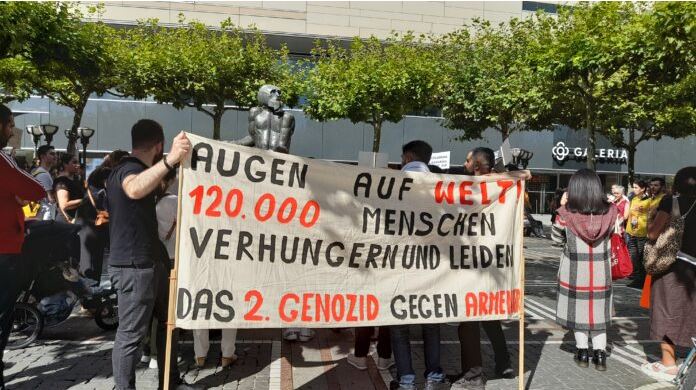by Muriel Mirak-Weissbach
Armenians in Berlin, Hamburg and Frankfurt were joined by local human rights groups in demonstrations to protest the threatened genocide in Karabakh (Artsakh), and demand effective humanitarian and political intervention.
The Berlin-based grass-roots movement Theophanu Club Germany, along with the Central Council of Armenians in Germany (ZAD), the human rights group AGA, and others, shared a call issued by the United Peoples Movement to Save Artsakh for simultaneous demonstrations worldwide on September 2. In Frankfurt, in addition to the ZAD were the Armenian Cultural Association in Hessen (AKH), Association of Genocide Opponents (VVG), Democratic Peoples and Cultural Center (DVK), New Democratic Youth Club (VNDJ), and in Hamburg, also the Armenian Youth Association-Cilicia (AJK).
Read also
When the groups announced their plans for protest actions, news of the Nagorno-Karabakh crisis had finally broken in the German press, and by the time organizers put up their banners, the impending hunger catastrophe had become major news in national media. The mass weeklies, Der Spiegel, Die Zeit, and Stern, as well as leading dailies, online media, and national radio and television, ran interviews and reports.
In the wake of growing public exposure, expanding protest letters, petitions, and demonstrations, German Foreign Minister Annalena Baerbock was forced to issue a stronger statement than heretofore. In the context of the EU Foreign Ministers meeting in Toledo, Spain on August 31, she declared: “The people in Nagorno-Karabakh must finally receive what they need to live. The Lachin Corridor must be open for humanitarian aid.”
In Berlin, Lilith Kocharyan from the Theophanu Club stressed that their gathering was taking place on 32nd Independence Day of Karabakh: its population now blockaded, facing starvation, and its very existence threatened. Thus, the crucial importance of international solidarity.
Summarizing the developments leading up to the existential crisis, she outlined the measures required to save the population. “Genocide Watch,” she reported, “classifies the situation in Artsakh to be at the ‘Persecution’ stage, the 8th of 10 recognized stages of Genocide, and urges immediate intervention and sanctions to be imposed on Azerbaijan by the world powers.” Since calls from several governments, and orders from international courts to lift the blockade have fallen on deaf ears, she demanded that the EU “implement its Responsibility to Protect (R2P) commitment,” which means protection from ethnic cleansing and genocide, by imposing sanctions, launching international criminal prosecutions, “and as a last resort, military action.”
Concretely, the EU should pressure Azerbaijan to open the Lachin Corridor, and humanitarian air corridor in Artsakh; withdraw its troops from Armenia’s sovereign territory, refrain from future military aggressions, and work towards peace; unconditionally and urgently release all Armenian prisoners and detainees from the 2020 war and thereafter, in accordance with the Geneva Conventions and 2020 ceasefire document. In addition, she called for an international fact-finding mission in Artsakh as well as the establishment of a “self-determination and security plan for Artsakh’s Armenian population.”
Gerayer Kocharyan of AGA spoke, as did Jonathan Spangenberg, chairman of the ZAD, who issued a plea for all Armenians in the diaspora to come together to mount enough pressure to force political action.
At the same time, farther south, protesters in Frankfurt unfurled banners and held up pickets denouncing the genocidal actions of Azerbaijan and presenting their demands. Shushan Tumanyan, vice chairwoman of the AKH, greeted the growing crowd, and Samwel Lulukyan (ZAD) followed. AKH member Susanna Margaryan, who is a journalist from Armenia, reported on the worsening situation, and Döne Gündüz (VVG) read an appeal issued on August 16 by a group of Turkish intellectuals calling for a humanitarian airlift for Karabakh.
The simultaneous demonstrations in three German cities, themselves only one part of a worldwide mobilization, signal a growing process of unification of political and civil society forces in the Armenian diaspora. Among the most important institutions is the Armenian Church, which is co-organizer of the next planned demonstration in Berlin, and other cities, on September 23.
On September 1, weltkirche.de (world church-germany) reported that the Primate of the Diocese of the Armenian Apostolic Church in Germany, Bishop Sevropé Isakhanyan, warned of impending genocide in Karabakh and called for German assistance. According to the news wire, Isakhanyan demanded that Foreign Minister Baerbock, who had just spoken on the issue, take “concrete steps toward an immediate opening of the Lachin Corridor and the protection of the Armenians in Nagorno-Karabakh.” He also criticized the German government’s position to date. Referring to a recent comment by government press spokesman Steffen Hebestreit, who had characterized the term “genocide” as a “battle cry” and “propaganda” in connection with Artsakh, the Bishop said such terms would remind many Armenians of the passivity of the German Empire during the First World War, “when the elimination of the Armenians was accepted, so as not to endanger the wartime alliance with the Ottoman Empire.”
Isakhanyan expanded on his views two days later with podcaster and actor Gerd Buurmann. Asked about former Prosecutor Luis Moreno Ocampo’s genocide warning, the bishop agreed, saying others had also spoken of a “creeping genocide”; Azerbaijan’s aim was to “de-Armenianize” the region.
He expressed his hope that the international community, and Germany, engage for a peace between Armenia and Azerbaijan, a “just peace” which respects the rights of the people of Nagorno-Karabakh




























































